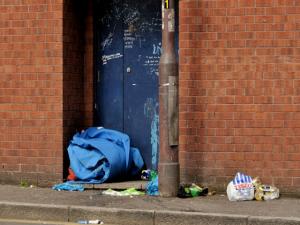
By Q Radio News
Almost 17,000 families presented as homeless to the Housing Executive during the past year, despite the COVID-19 lockdown - levels that charities have branded as 'unacceptably high.'
Staff and volunteers are continuing to work in the sector with no Coronavirus outbreaks having been recorded in services.
Hostels are operating at reduced capacity due to social distancing and the need for isolation beds.
Demand for temporary accommodation has almost doubled and staff are seeing relationships and sharing arrangements break down under the strain of the pandemic.
Between April and September there were 4,766 placements in temporary accommodation. While this figure includes people placed more than once, it far exceeds the volume of beds available in homelessness services, requiring more use of bed and breakfast and hotel accommodation which is necessary but not ideal.
Services have adapted quickly to cope with demand, providing more outreach support to people placed in temporary lets and rooms in the private sector.
And these high levels of homelessness are expected to grow as unemployment rises.
Nicola McCrudden from the Council for Homelessness spoke to Q Radio about the ongoing problem:

Nicola McCrudden
The Everyone In initiative in the wake of the pandemic, provided shelter for people sleeping rough and has been a success, but it needs to be sustained. The challenge now is to keep people off the streets especially as winter bites.
The swift response from the Housing Executive and homelessness services in response to Covid-19 demonstrates what can be achieved with joint, emergency effort.
I welcome Communities Minister Carál Ní Chuilín’s recent statement that will see the Housing Executive build homes once again, and her commitment to strengthen protections in the private rented sector.
It will be some time before house building is at the level required to provide enough social homes for those who need them. Until then a sustainable supply of suitable temporary and move on accommodation is needed, as well as legislative reform with greater emphasis on homelessness prevention.
While homelessness is fundamentally a sign of housing failure, housing alone cannot solve homelessness. It requires close working and joint funding across government departments involving health, justice, economy and communities.
We need to build on collaborative working practices developed during the pandemic and ensure providers receive multi-year budget funding to continue the vital and often life-saving work they do.
That means ensuring people are placed in the right accommodation with the right support in place and are provided with a safe and secure home they can afford.


 Man arrested after two women stabbed at house
Man arrested after two women stabbed at house
 Gordon Lyons commits to attending GAA match amid criticism (
Gordon Lyons commits to attending GAA match amid criticism (
 Evangelical Christian family disrupt gala dinner attended by Taoiseach
Evangelical Christian family disrupt gala dinner attended by Taoiseach
 Father who murdered infant son jailed for at least 20 years
Father who murdered infant son jailed for at least 20 years
 NI CHILDREN’S BOOKS SERIES THE WEATHERBIES LAUNCH ALL-IRELAND SCHOOLS COMPETITION
NI CHILDREN’S BOOKS SERIES THE WEATHERBIES LAUNCH ALL-IRELAND SCHOOLS COMPETITION